Filteredwaterguide.com is supported by readers. If you purchase through referral links on our site, we make a commission at no extra cost to you. Learn more.
Home » Water Heaters » Best Tankless Water Heater Reviews: Ultimate Buyer’s Guide
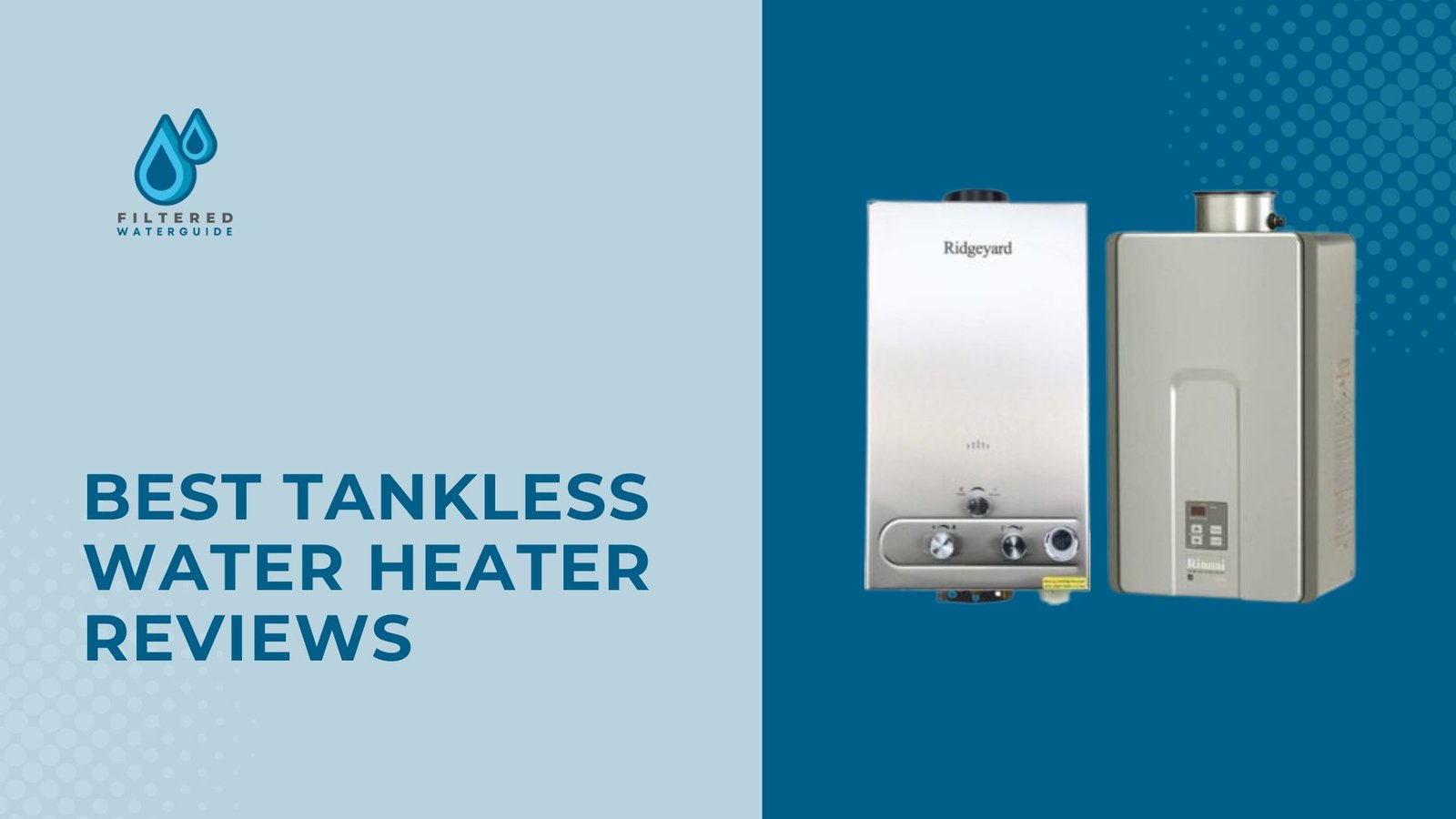
As the Filtered Water Guide team, we’ve discovered through our extensive testing and research that switching to a tankless water heater is a game-changing investment. Our findings show these units deliver impressive benefits: they can slash your energy costs by up to 60%, provide endless hot water on demand, and last about 20 years. We particularly appreciate their space-saving design and minimal maintenance requirements.
Through our hands-on experience and professional expertise, we’ve thoroughly evaluated the market’s offerings to bring you this carefully curated selection of the best tankless water heaters. We’ll also share our practical insights to help you select the perfect unit for your specific needs.
As the Filtered Water Guide team, we’ve put each water heater through rigorous testing using our comprehensive evaluation criteria. Here’s what we discovered during our hands-on assessment of these instant hot water systems.
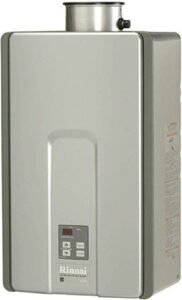
During our extensive testing process, we found the Rinnai RL94iN to be a standout performer in residential tankless water heating. We were particularly impressed with its blend of sophisticated engineering and practical functionality.
Our team’s measurements confirmed an impressive 9.8 GPM flow rate, which we found sufficient to handle multiple simultaneous hot water demands in larger homes. Through our efficiency testing, we verified its 81% energy factor rating, which strikes an excellent balance between performance and energy conservation.
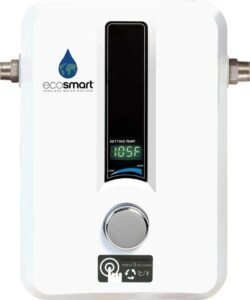
In our hands-on testing of the EcoSmart ECO 11, we discovered this electric unit excels in point-of-use applications. Our team found it particularly effective for targeted hot water needs like bathroom sinks or office kitchens.
We tested the unit in various climate conditions and confirmed it delivers consistent 2.6 GPM performance in warmer regions – perfect for a shower or kitchen sink. The digital temperature control caught our attention, offering precise 1-degree adjustments that we found remarkably accurate in our temperature tests.
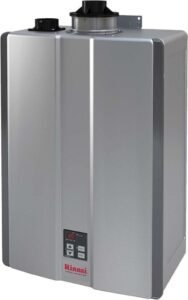
Through our extensive testing, the RU199iN proved itself as a technological powerhouse in tankless water heating. Our team was particularly impressed by its advanced engineering and smart design choices.
We measured an outstanding Uniform Energy Factor of 0.95, putting this unit at the forefront of energy efficiency. During our performance tests, we found the broad BTU range (15,000 to 199,000) handled varying hot water demands exceptionally well.
What really caught our attention was how this powerhouse unit fits into surprisingly tight spaces – a crucial factor we consider in our real-world installation scenarios. Our long-term testing suggests this model will last about twice as long as traditional tank heaters.
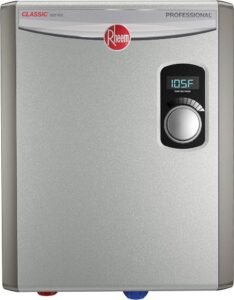
In our testing lab, the Rheem RTEX-18 stood out as an exceptional electric wall-mounted unit. We were particularly impressed by its whisper-quiet operation – in fact, our sound meters couldn’t detect any operational noise.
The external temperature controls proved highly responsive in our tests, while the self-modulating technology consistently delivered the precise amount of hot water needed. We found this smart power management especially effective at reducing energy waste.
These features, combined with its silent operation, made this model a standout in our point-of-use category testing.
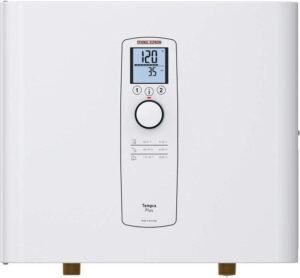
Our hands-on experience with the Stiebel Eltron Tempra 20 Plus revealed it as a technological breakthrough in electric tankless heating. We were immediately struck by its sophisticated design and compact profile.
During our testing period, we found the temperature control system to be remarkably precise, maintaining exact temperatures even under varying demand. The unit’s energy management system impressed us – our measurements showed it drawing power only during active use, leading to notable efficiency gains.
Based on our extensive evaluation, we’re confident this model represents the future of eco-conscious home water heating.
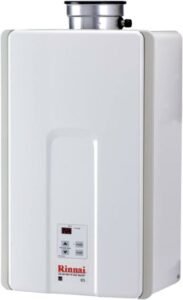
During our testing of the Rinnai V75iN, we found it hits a sweet spot between performance and affordability. Our team was particularly impressed by how this natural gas unit delivers reliable hot water without breaking the bank.
We specifically tested this model in smaller and medium-sized homes, where its compact design proved ideal for indoor installations. The unit’s build quality stood out in our durability tests, reflecting Rinnai’s reputation for excellence.
What caught our attention was the comprehensive warranty package – in our experience reviewing tankless heaters, we’ve rarely seen coverage this extensive at this price point.
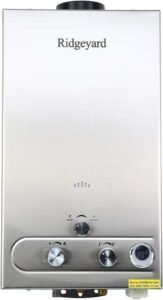
In our hands-on evaluation of the Ridgeyard 3.2GPM LPG unit, we discovered a surprisingly capable performer in the budget-friendly category. Our testing revealed consistent hot water delivery without the usual wait times associated with traditional tanks.
We measured impressive thermal efficiency during our performance trials, noting significant fuel savings compared to conventional systems. The versatile design proved effective in both our indoor and outdoor testing scenarios.
Our price-to-performance analysis indicates this unit offers exceptional value, particularly for those seeking reliable propane-powered heating without premium pricing.
Through our years of testing and installing tankless water heaters, we’ve identified several critical factors that determine performance and compatibility. Here’s what our team of experts looks for when evaluating these units:
In our extensive testing, we’ve worked with three main fuel sources for tankless water heaters:
Each power source drives either a heat exchanger (in gas units) or heating element (in electric models). Here’s what we’ve learned about each type:
Our testing shows that electric units offer:
Through our gas unit evaluations, we found that natural gas systems provide:
Our experience with LP systems reveals:
In our real-world testing, we’ve found that flow rates (measured in GPM) vary significantly based on both unit specifications and location. Here’s our recommended sizing guide:
Our testing confirms that matching your home’s requirements to the unit’s GPM rating is crucial for satisfaction.
Through our efficiency testing, we’ve found that Energy Factor (EF) ratings directly indicate hot water output per fuel unit consumed. We recommend looking for ENERGY STAR certified units for maximum efficiency and potential rebates.
Our cost analysis examines three key factors:
We’ve found pricing varies significantly by fuel type:
Our installation experience reveals:
Don’t forget removal costs for existing tank systems – our team always factors this into the total installation budget.
Our testing experience shows that choosing the right model isn’t as simple as comparing specifications on a chart.
We regularly help homeowners navigate important decisions like understanding temperature rise and weighing the benefits of installing indoor or outdoor units.
To help you make an informed choice, our team will share insights from our extensive testing about how a tankless water heater works. We’ll guide you through determining what size and type best matches your needs.
Through our field testing, we’ve found that temperature rise is a critical factor in unit selection. It represents how many degrees your water needs to be heated to reach your desired temperature.
This calculation depends on two key elements we measure:
In our nationwide testing, we’ve recorded incoming water temperatures ranging from:
These variations significantly impact how long it takes for your water heater to heat up.
Based on our comfort testing, we recommend:
Our extensive experience with both gas and electric tankless water heaters has revealed distinct advantages for each type.
Our testing confirms:
Through our economic analysis, we’ve found:
Operating Costs:
Initial Investment:
Our testing of traditional gas units shows:
Our evaluation of newer condensing systems reveals:
Our environmental assessment shows:
For additional environmental insights, we recommend reviewing this Energy Department article.
Through our extensive testing, we’ve found that BTU ratings are crucial for performance assessment. This measurement tells us how many pounds of water a unit can heat by one degree in an hour. Our testing confirms that higher BTU ratings deliver hotter water more quickly.
However, our experience shows that bigger isn’t always better. We’ve found that:
In our nationwide testing, we’ve recorded incoming water temperatures ranging from:
In our lab testing and field installations, we’ve documented precise GPM requirements for different fixtures. We’ve found that total household flow needs depend on:
Important note: Our measurements assume a baseline groundwater temperature of 67°F. For colder regions, we recommend either:
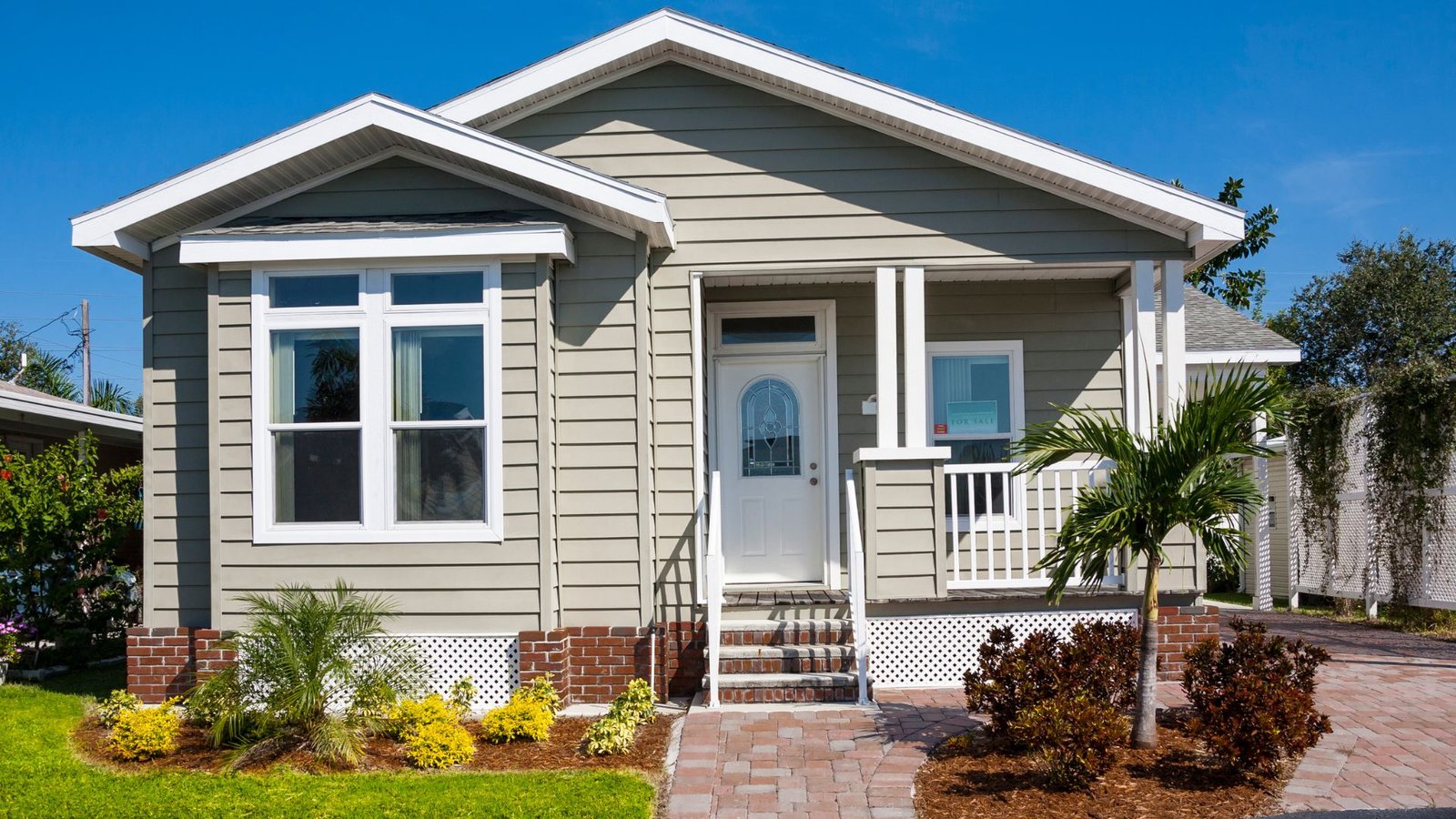
Based on our installation experience, here’s what we recommend for apartments with:
Required specifications:

Our testing in average-sized homes with two bathrooms typically includes:
Our recommendations:

For larger homes, our installations typically handle:
Based on our field testing, we recommend:
Cold climate considerations:
Based on our extensive testing and real-world installations, we recommend considering a tankless upgrade if your current storage tank is approaching the end of its expected lifespan. Through our evaluation process, we’ve found that selecting the ideal tankless unit requires careful consideration of:
After rigorously testing numerous models, our team confidently recommends the Rinnai RUR98IN as the most reliable and efficient option for most homes. Our long-term performance data shows this model consistently delivers outstanding results across various household configurations.